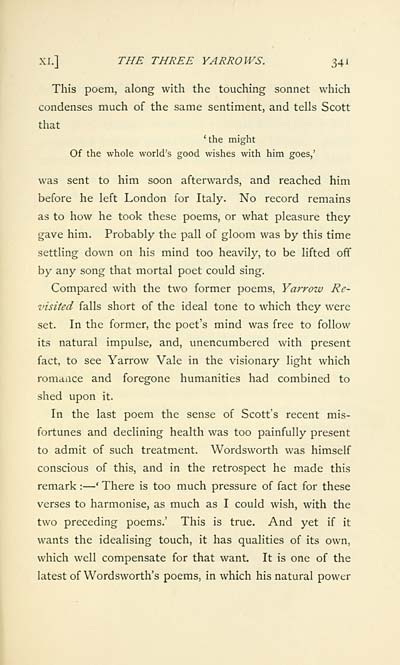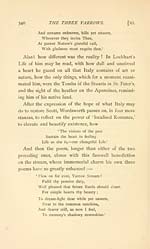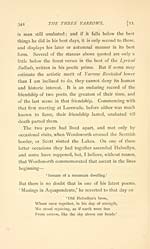Ossian Collection > Aspects of poetry
(357)
Download files
Complete book:
Individual page:
Thumbnail gallery: Grid view | List view

XI.] THE THREE YARROWS. 341
This poem, along with the touching sonnet which
condenses much of the same sentiment, and tells Scott
that
' the might
Of the whole world's good wishes with him goes,'
was sent to him soon afterwards, and reached him
before he left London for Italy. No record remains
as to how he took these poems, or what pleasure they
gave him. Probably the pall of gloom was by this time
settling down on his mind too heavily, to be lifted off
by any song that mortal poet could sing.
Compared with the two former poems, Yarrow Re-
visited falls short of the ideal tone to which they were
set. In the former, the poet's mind was free to follow
its natural impulse, and, unencumbered with present
fact, to see Yarrow Vale in the visionary light which
romance and foregone humanities had combined to
shed upon it.
In the last poem the sense of Scott's recent mis-
fortunes and declining health was too painfully present
to admit of such treatment. Wordsworth was himself
conscious of this, and in the retrospect he made this
remark : — * There is too much pressure of fact for these
verses to harmonise, as much as I could wish, with the
two preceding poems.' This is true. And yet if it
wants the idealising touch, it has qualities of its own,
which well compensate for that want. It is one of the
latest of Wordsworth's poems, in which his natural power
This poem, along with the touching sonnet which
condenses much of the same sentiment, and tells Scott
that
' the might
Of the whole world's good wishes with him goes,'
was sent to him soon afterwards, and reached him
before he left London for Italy. No record remains
as to how he took these poems, or what pleasure they
gave him. Probably the pall of gloom was by this time
settling down on his mind too heavily, to be lifted off
by any song that mortal poet could sing.
Compared with the two former poems, Yarrow Re-
visited falls short of the ideal tone to which they were
set. In the former, the poet's mind was free to follow
its natural impulse, and, unencumbered with present
fact, to see Yarrow Vale in the visionary light which
romance and foregone humanities had combined to
shed upon it.
In the last poem the sense of Scott's recent mis-
fortunes and declining health was too painfully present
to admit of such treatment. Wordsworth was himself
conscious of this, and in the retrospect he made this
remark : — * There is too much pressure of fact for these
verses to harmonise, as much as I could wish, with the
two preceding poems.' This is true. And yet if it
wants the idealising touch, it has qualities of its own,
which well compensate for that want. It is one of the
latest of Wordsworth's poems, in which his natural power
Set display mode to: Large image | Transcription
Images and transcriptions on this page, including medium image downloads, may be used under the Creative Commons Attribution 4.0 International Licence unless otherwise stated. ![]()
| Early Gaelic Book Collections > Ossian Collection > Aspects of poetry > (357) |
|---|
| Permanent URL | https://digital.nls.uk/78389556 |
|---|
| Description | Selected books from the Ossian Collection of 327 volumes, originally assembled by J. Norman Methven of Perth. Different editions and translations of James MacPherson's epic poem 'Ossian', some with a map of the 'Kingdom of Connor'. Also secondary material relating to Ossianic poetry and the Ossian controversy. |
|---|
| Description | Selected items from five 'Special and Named Printed Collections'. Includes books in Gaelic and other Celtic languages, works about the Gaels, their languages, literature, culture and history. |
|---|

